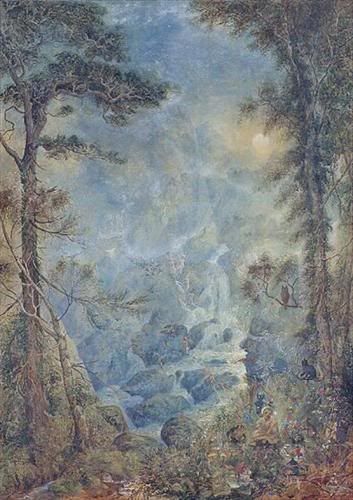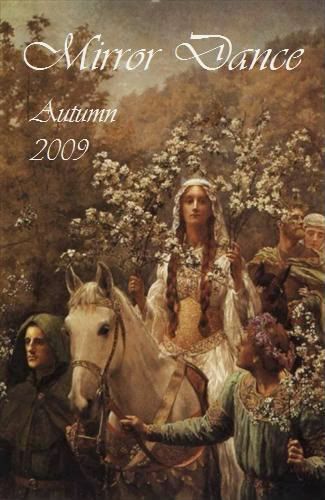The Remembering Trees
by Stefan Bachmann

Halfway up a bare and rocky mountainside, there stands a knot of ancient pines, bent and twisted against the wind. Their roots claw for hold on the unforgiving slopes, their branches intertwine like the arms of old men huddling round a coffin. It is raining softly. A fog is gathering in the valley, creeping up. Far below, the lights of a village can just be seen, poking feebly through the gloom.
Two men are scrambling up toward the snarl of trees. They are running frantically, tripping, falling, only to drag themselves up again and continue on. Heavy packs weigh them down and one of them is limping badly. Lights are bobbing up the track behind them. Shouts ring against the stone.
Moments later, a group of figures emerge from the trailing fog, lanterns in hand. Some brandish pitchforks; one is flailing a blunderbuss. They are swifter than the two fleeing, wending their way skilfully among the rocks, gaining on them with every step.
The two men know that on these barren slopes they are no match for their pursuers. So when they reach the trees they do not hesitate; they wriggle in, scrabbling through a thicket of trunks and branches, coarse bark and pine needles, until tumbling into a small clearing. There they stop, winter-still, holding their breath and listening.
Outside, the pursuers halt. One of them flings his weapons to the ground, cursing loudly. His wrath is little more than a mutter, though, to the two men inside. For suddenly it seems there are no longer only a few crooked trees separating them, but a deep forest, an endless tangle of aged wood, branches and needles and quiet decay. Even the air is changed, musty and close like the attics of an old, old house.
A sense of safety washes over the men and they collapse, winded, to the floor of the clearing. It is soft with dried pine needles, and, they realise, strewn with an abundance of rubbish: rope; buttons; shreds of clothing; a rusted blade and the rotting remains of a wicker basket. The men heave off their packs and run their hands through the objects, sifting.
And then the trees begin to remember.
High above, where the black branches of the pines writhe and twist into each other, a tiny pale hand reaches down. White fingers brush the dark needles, silently, gently, feeling for something. The fingers close—around a branch perhaps, long broken off and gone—and a little boy swings down out of the shadows. Every whit of his features is white and sharp as a shard of porcelain, his clothes too, and his hair. He clambers into a sitting position on his invisible bough, opens a letter and sits reading it, over and over again, a joyful expression on his face.
The men do not notice him at all, continue picking through the rot.
A lady in a great dress emerges next. She holds a child in each arm, and two more trail behind her, clutching at the buttons of her skirts. Unlike the boy on the branch, they are all rather hazy (it has been ninety years since they sought refuge from a raging storm). And yet still some details stand sharply out. The little girl's smile, for instance, when her mother leans down and murmurs something in her ear. The child's eyes are invisible, forgotten in time, her clothes a mangy blur, and she has no hair to speak of, but that smile... As bright and clear as a moonlit road. The trees had remembered that.
At the sight of the woman and her children, the two men leap up with a shout, only to step on the toes of a giant figure grasping a long and dripping knife. After him comes a man bound in ropes, then a wild-looking hag holding a basket. A wrinkly baby slumbers inside it.
Within moments, the entire clearing is thronging with misted shapes. Some are no more than a wisp, a breath of smoke. Others seem almost solid, even giving off a scent, a sound, whatever the trees can remember.
The two men back away in terror. The one with the limp slips, skids on the pine needles, sweeping them aside. A little skeleton lies underneath, broken over the knobbly roots of the trees. And high among the boughs, the memory of a boy sits swinging his legs. The other man kneels to aid his comrade, when a glint in the darkness catches his eye—a set of tiny teeth, smiling a smile as bright and clear as a moonlit road.
Out on the mountainside, the pursuers have encircled the thicket. A gut-curdling scream sounds from within, fast-followed by the two men. One of them drags the other beside him, who groans in agony as the trees rasp against him. Straight they rush into the ready hands of the pursuers, and inside, on the soft floor of the clearing, they leave behind two heavy packs, laden with gold from the village vault, and a leg, a limping leg wrenched from just below the knee.
Something to remember them by...
Stefan Bachmann is sixteen years old and lives in Switzerland. Despite what this story may lead you to believe, he absolutely adores old and twisted trees. He has been published by Every Day Fiction and is a book reviewer for the best review site in the world: thebookbag.co.uk"
Where do you get the ideas for your work?
Usually from other writings. I find a sentence I like, or an image that sticks in my mind, and try to make something of my own out of it. By the time I'm finished with it, though, the idea will have changed so much that you'll never guess from where I first snitched it. I also sometimes get ideas after I've practiced the piano for several hours. To me, it seems writing and music are two rivers from the very same spring.






